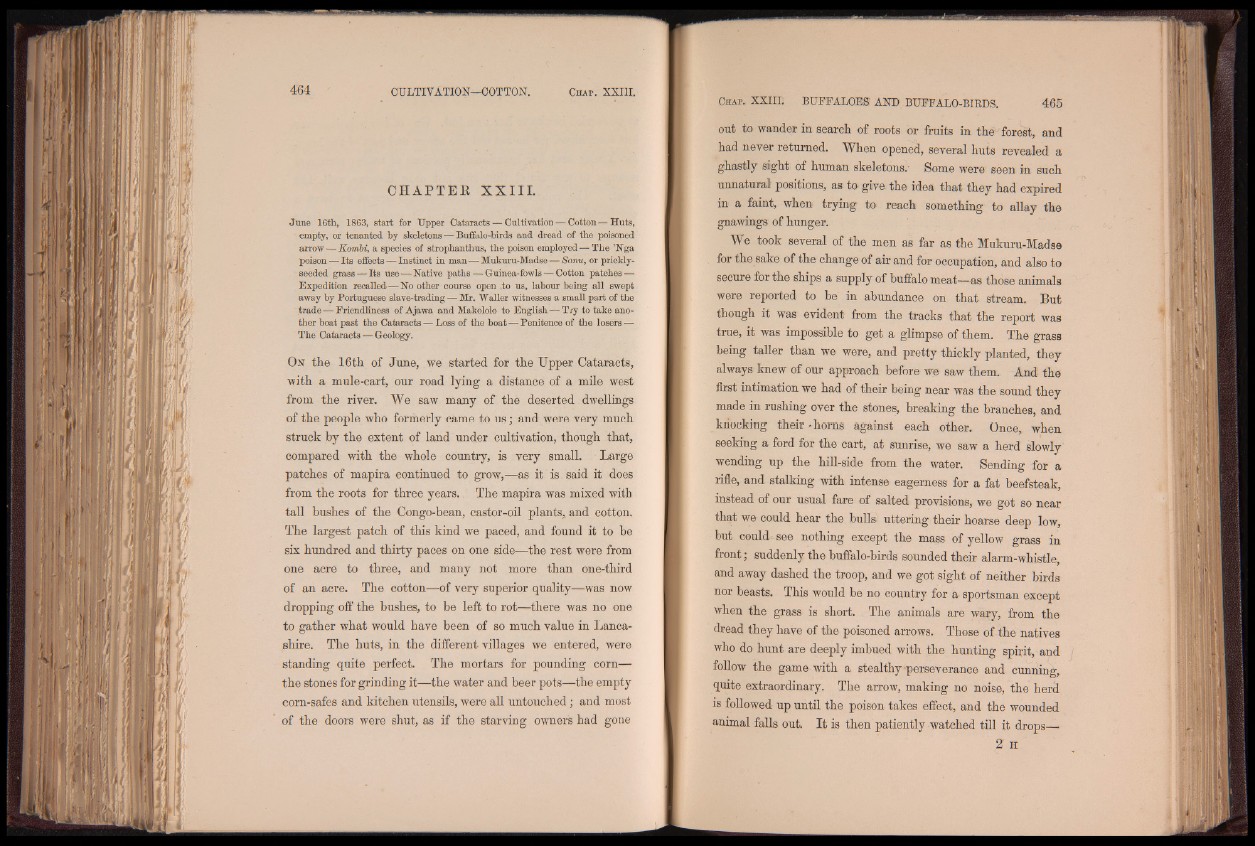
C H A P T E R X X I I I .
June 16th, 1863, start for Upper Cataracts — Cultivation — Cotton—Huts,
empty, or tenanted by skeletons — Buffalo-birds and dread of the poisoned
arrow — Kombi, a species of strophanthus, the poison employed —The ’Nga
poison -yilts effects—Instinct in man-—Mukuru-Madse — Sanu, or prickly-
seeded grass — Its use — Native paths — Guinea-fowls — Cotton patches —
Expedition reoalled—No other course open .to us, labour being all swept
away by Portuguese slave-trading — Mr. Waller witnesses a small part of the
trade.— Friendliness of Ajawa and Makololo to English—Tiy to take another
boat past the Cataracts — Loss of the boat — Penitence of the losers —
The Cataracts — Geology.
On the 16th of June, we started for the Upper Cataracts,
with a mule-cart, our road lying a distance of a mile west
from the river. We saw many of the deserted dwellings
of the people who formerly came to u s; and were very much
struck by the extent of land under cultivation, though that,
compared with the whole country, is very small. ■ Large
patches of mapira continued to grow,—as it is said it does
from the roots for three years. The mapira was mixed with
tall bushes of the Congo-bean, castor-oil plants,, and cotton.
The largest patch of this kind we paced, and found it to be
six hundred and thirty paces on one side—the rest were from
one acre to three, and many not more than one-third
of an acre. The cotton—of very superior quality—was now
dropping off the bushes, to he left to rot—there was no one
to gather what would have been of so much value in Lancashire.
The huts, in the different villages we entered, were
standing quite perfect. The mortars for pounding corn—
the stones for grinding it—the water and beer pots—the empty
corn-safes and kitchen utensils, were all untouched; and most
of the doors were shut, as if the starving owners had gone
out to wander in search of roots or fruits in the forest, and
had never returned. When opened, several huts revealed a
ghastly sight of human skeletons.- Some were seen in such
unnatural positions, as to give the idea that they had expired
in a faint, when trying to reach something to allay the
gnawings of hunger.
We took several of the men as far as the Mukuru-Madse
for the sake of the change of air and for occupation, and also to
secure for the ships a supply of buffalo meat—as those animals
were reported to he in abundance on that stream. But
though it was evident from the tracks that the report was
true, it was impossible to get a glimpse of them. The grass
being taller than we were, and pretty thickly planted, they
always knew of our approach before we saw them. And the
first intimation we had of their being near was the sound they
made in rushing over the stones, breaking the branches, and
knocking their -horns against each other. Once, when
seeking a ford for the cart, at sunrise, we saw a herd slowly
wending up the hill-side from the water. Sending for a
rifle, and stalking with intense eagerness for a fat beefsteak,
instead of our usual fare of salted provisions, we got so near
that we could hear the hulls uttering their hoarse deep low,
but could see nothing except the mass of yellow grass in
front; suddenly the buffalo-birds sounded their alarm-whistle,
and away dashed the troop, and we got sight of neither birds
nor beasts. This would be no country for a sportsman except
when the grass is short. The animals are wary, from the
dread they have of the poisoned arrows. Those of the natives
who do hunt are deeply imbued with the hunting spirit, and
follow the game with a stealthy perseverance and cunning,
quite extraordinary. The arrow, making no noise, the herd
is followed up until the poison takes effect, and the wounded
animal falls out. I t is then patiently watched till it drops—
2 H